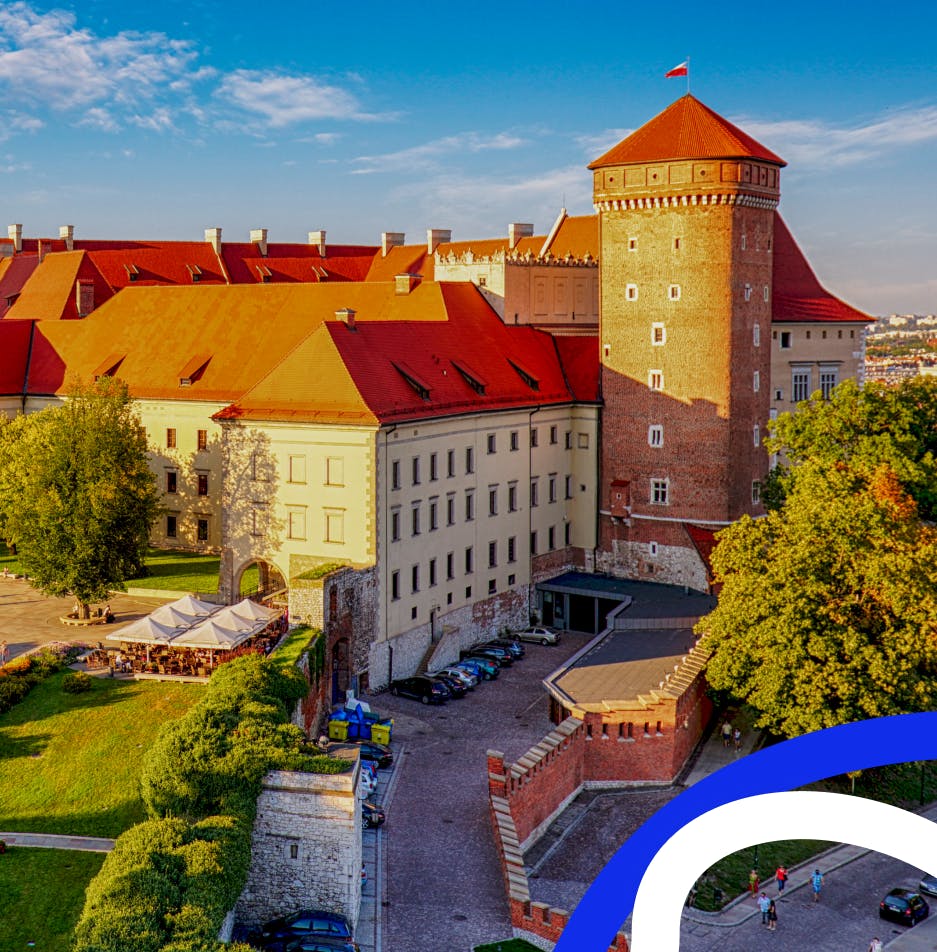Moving to Poland: Relocation Guide
Poland features the best of what Europe has to offer. It is a Central European jewel with historic cities, picturesque mountain views, and a rich culture. The country also has a diversified economy, making it a popular destination for expats.
If you're looking to move employees to Poland, this is the guide for you. As with any relocation, moving to Poland requires a mix of preparation, planning, and patience. Here's what you need to know to make it a success.
Let's get started!


Table of contents

Which countries are visa - and -permit exempt for Poland?
Citizens of EU/EEA countries and Switzerland
EU, EEA, and Swiss citizens enjoy complete freedom of movement across each other's countries. They don't need visas or work permits to live and work in Poland.
Visa-waiver agreements
Citizens of many other countries also fall under visa-waiver agreements. Some of these countries include (but are not limited to) Australia, Brazil, Canada, Japan, Mexico, New Zealand, and the United States. Foreign nationals from these countries can enter Poland for tourism and business purposes for stays of up to 90 days within a 180-day period. However, they will need work permits for employment in Poland.
How many types of work visas are there in Poland?

EU Blue Card
The EU Blue Card allows highly qualified non-EU workers to live and work in Poland. To be eligible, your employee must fulfil the following criteria:
✅ Higher education qualification - such as a university degree or at least five years of professional experience in the relevant field
✅ A valid employment contract or binding job offer in Poland for a minimum of one year - with high qualifications
✅ The gross annual salary must be at least 150% of the average gross annual salary in Poland from the previous year
✅ Proof of health insurance coverage in Poland.
Your talent is in good hands with us
10,000+ relocations
4.75 avg. CSAT
4.9 Rating on![]()
Resident permits in Poland
The Schengen C and National D visas are typically issued in conjunction with employees on work permits. However, the Schengen C only allows for short stays, and the National D only lasts one year. For those interested in how to get citizenship in Poland, or at least a more extended stay, they'll need a residence permit.
- Temporary Residence Permit
A temporary residence permit allows employees to stay in Poland for up to 3 years. To be eligible for this permit, employees will need an employment contract or proof of job offer and, if applicable, a work permit issued by the Polish authorities.
- Permanent Residence Permit
A permanent residence permit allows employees to stay in Poland indefinitely. This is intended for individuals who have strong ties to Poland or meet specific long-term residency criteria. The Permanent Residence Permit is valid indefinitely, but the card issued needs to be renewed every 10 years.
What are the types of work permits in Poland?
📌 Type A Work Permit
The Type A Work Permit is for foreign workers with an employment contract with a Polish company. Type A holders need a residence visa and permit to live in Poland legally.
📌 Type B Work Permit
Type B Work Permits are only for those who serve as board members of a Polish company and plan to reside in the country for more than six months.
📌 Type C Work Permit
The Type C Work Permit is designed for intra-company transfers. This is when a foreign company sends an employee to work at a Polish branch office or subsidiary company for more than 30 days.
📌 Type D Work Permit
Type D Work Permits are for when a foreign employer sends an employee to Poland to provide export services. The company must have no registered location in Poland to qualify for a Type D permit.
📌 Type E Work Permit
Sort of a catch-all, the Type E Work Permit covers rare circumstances that don't fit in Types A through D. Typically, these are short-term assignments, such as when an employee attends industry-specific training or an IT team member works on a technical project implementation.
📌 Type S Work Permit
The Type S Work Permit is granted to short-term seasonal workers in agriculture or hospitality. The nature of the work determines the length of stay, which is typically no more than nine months in one calendar year.
📌 Declaration of entrusting work
It’s a “fast-track” work permit for the internationals that are the citizens of Armenia, Belarus, Georgia, Moldova, Russia, or Ukraine. The criteria include:
- the employment period will not exceed 24 months
- the work to be performed by the international is not seasonal for which a full permit must be obtained

What are the qualification requirements for a work visa or permit in Poland?
In general, there are few qualification requirements for a work permit in Poland. The exception is for employees working in jobs regulated by Polish law. This includes doctors, lawyers, architects, and other professions typically requiring licensure.
Is a formal assessment of qualifications required?
The assessment process involves submitting educational documents like diplomas, transcripts, certifications, and employment history. Each profession's relevant Polish regulatory bodies will compare the employee's qualifications to Polish standards. In very rare cases, an employee might be required to take training or tests to validate their qualifications.
Preparing the documents: What do employees need to do to get ready?
While you, as the employer, typically initiate the work permit application, your employee is also responsible for gathering plenty of personal documents before they migrate to Poland. Before your employee applies for the work permit, please note that the Voivodeship Office might ask for a labor market test. This evaluates whether a Polish or EU/EEA/Swiss candidate could fill the role. If requested, be prepared to justify why your employee is the right choice.
First, prepare a draft of the employment agreement. This should be signed with a wet signature after the arrival in Poland. Please note that a qualified electronic signature (QES) is also accepted but very rarely practiced. Even existing employees will need this, as a detailed contract is an essential component of the application process. Ensure to include the position title, salary, contract duration, and other terms. The more specific you can be about duties and expectations, the better.
You'll need other documents in order to submit a work permit application to the Voivodeship Office (the Polish Immigration Authority). These include proof of payment for the work permit and your company's registration documents.
Once the work permit is approved, it's time to work on the residency visa application. Employees must collect several documents to apply for the National D long-term stay visa. Below are the documents that employees will also need to prepare:
- Valid passport: The passport's expiry date must exceed their intended stay in Poland by at least three months.
- Qualification documents: Employees should gather original diplomas, professional certificates, and other documents verifying their relevant qualifications.
- Health insurance: Valid comprehensive health insurance will provide €30,000 worth of coverage throughout the entire Schengen Area, not just Poland
- Family documents: Marriage certificates, birth certificates, and other documents that establish a relationship with your employee will be necessary if family members are also moving to Poland.
- Photographs: Several recent, passport-sized photographs are typically required for residence visa applications.


Can employees move to Poland with family?
Family members are allowed to migrate to Poland with your employee. If their spouse, registered partner, children, or dependent relatives are EU/EEA/Swiss citizens, they are free to stay in Poland as long as they like. Otherwise, family members will need their own residence visas. The exception applies to individuals on a visa-free movement such as Brazilian, British, US nationals, and others.
Be sure to review the family documents listed above in the "Preparing the documents" section. They will be essential in the permit and visa application processes.
How to move to Poland with pets
Common pets like cats and dogs are welcome to move to Poland, too, although there are some requirements:
- Microchip: Each pet must have a readable microchip for identification. Microchips must comply with ISO Standard 11784 or Annex A to ISO Standard 11785
- Vaccinations: All pets must have a rabies vaccination at least 21 days before travel.
- EU Animal Health Certificate: This is a general statement of the pet's health. Your employee can obtain this certificate from their veterinarian.
Each airline has different pet travel policies, although it's rare for pets to travel in the cabin these days. If your employees are uncomfortable with their pets going into the cargo hold, there are other options. Specialized pet relocation services exist in every country and can streamline the moving process.

Health insurance in Poland
Employees must have documentation of valid medical insurance when applying for a work permit. These policies are generally known as "visa insurance." Most major insurance carriers offer visa insurance designed for use in the Schengen Area (including Poland).
For an expat in Poland, a visa insurance policy must have a minimum coverage amount of €30,000 and cover expenses throughout the entire Schengen Area, and not just Poland. The policy's duration should cover the work permit's valid period. If the permit is renewed, the visa insurance policy must be renewed for an equal amount of time.
As the employer, you must deduct contributions for Poland's public health insurance system (NFZ or the National Health Fund) from the employee's paycheck. The standard rate is approximately 9% of the gross salary. NFZ provides access to standard medical services, such as doctor's visits, hospitalization, and prescriptions.
In addition to NFZ, employees can opt for supplementary private health insurance. While this is an additional expense, additional insurance can provide other benefits not fully covered in the public system, such as dental care and vision.

How to prepare for the registration appointment in Poland
Registration gives the employee access to government services and helps with tasks like opening a bank account or getting a driver's license.
Required documentation for registration includes:
- Passport
- Residence permit or work visa
- Proof of residency, such as a rental agreement or confirmation of a temporary hotel booking
If your employee doesn't speak Polish, it is recommended that they learn a few basic greetings and consider providing a translator for the registration appointment.
Tax & social security needs
In Poland, both the employer and employee contribute to social security, with deductions made directly from the employee's salary. The employer's portion is an additional business expense. Current rates are approximately 22% for the employer and 14% for the employee. You'll likely need to set up payroll processing in Poland to handle salary calculations, social security contributions, and tax withholding. This might include working with a payroll provider in Poland.
If your employee spends more than 183 days in Poland during one tax year, they become a Polish tax resident. This means their worldwide income is potentially taxable in Poland. However, Poland has double taxation treaties with many countries to prevent employees from being taxed twice on the same income. Ensure you understand the treaty between Poland and the employee's home country to avoid double taxation issues.
Remember that your employees might still need to file tax returns in their home country, even if their primary tax liability is in Poland.


How to find housing in Poland
The housing market in Poland can be competitive, especially in urban areas. Working with real estate agencies is often a better option for a company moving employees to Poland. Agents can better pinpoint homes or apartments in the right price range for employees and their families. However, Facebook groups and classified-ad websites regularly feature listings for rental homes and apartments if you can communicate with private Polish citizens.
FAQs about moving to Poland
Migrating to a new country is a thrilling experience, but it's normal to have questions. Here are answers to some of the most frequently asked questions expats in Poland have:
Trusted by top HR professionals
Explore other relocation guides

Relocation guide to Spain
Learn essential information on Spanish work visas, settling-in procedures, and more.

Relocation guide to the UK
Get practical advice on UK visa and work permits, as well as settle in the country, and more.

Global relocation guides
Explore our library with all the relocation guides and other useful resources.








